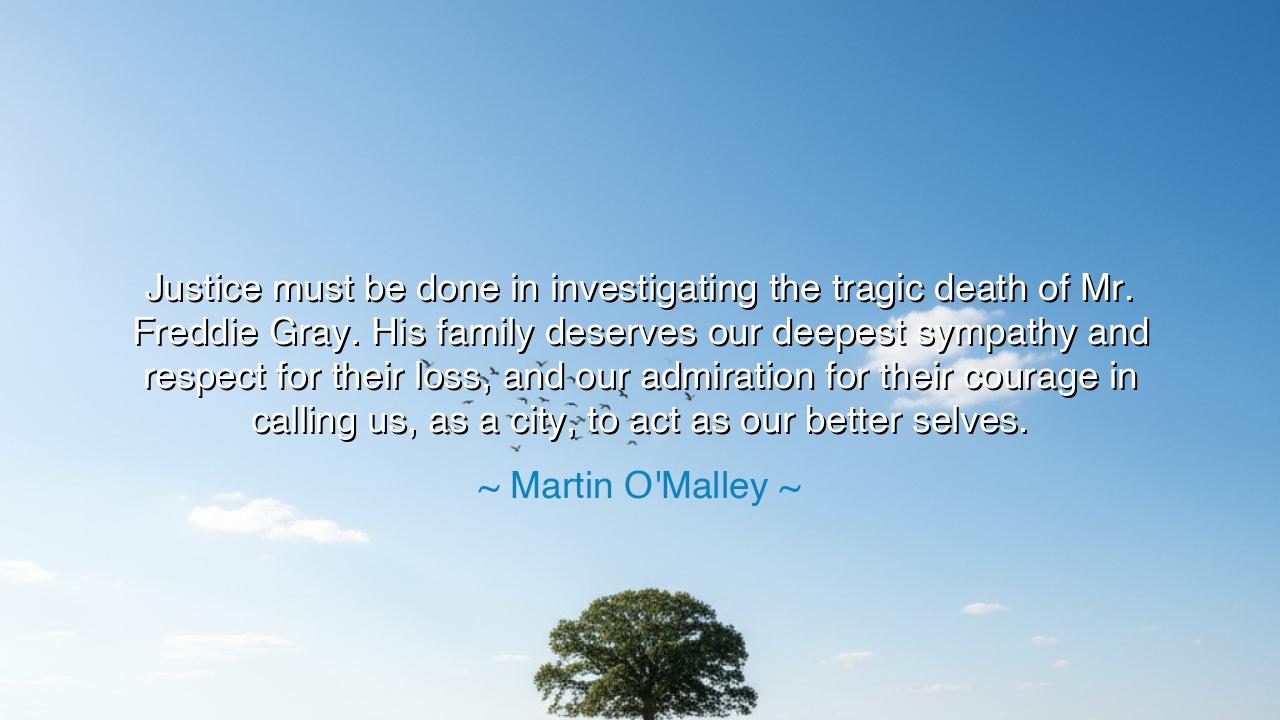
Justice must be done in investigating the tragic death of Mr.
Justice must be done in investigating the tragic death of Mr. Freddie Gray. His family deserves our deepest sympathy and respect for their loss, and our admiration for their courage in calling us, as a city, to act as our better selves.






When Martin O’Malley declared, “Justice must be done in investigating the tragic death of Mr. Freddie Gray. His family deserves our deepest sympathy and respect for their loss, and our admiration for their courage in calling us, as a city, to act as our better selves,” he spoke into a moment of grief that was also a crucible of conscience. His words were not only for the family of Freddie Gray, but for the city of Baltimore, for the nation, and for all people who must face the question: How do we respond to tragedy when it exposes the fractures of our society?
At the heart of O’Malley’s statement lies the demand for justice. He insists that it must not be delayed, dismissed, or diminished. In the death of Freddie Gray—an unarmed Black man who suffered fatal injuries in police custody—justice was not simply a legal matter, but a moral necessity. To call for investigation was to affirm that truth must be sought, that accountability must prevail, and that no life, however marginalized, is unworthy of the full measure of a society’s concern.
Alongside justice, O’Malley invokes sympathy and respect for the family. For grief is not only the sorrow of those who mourn, but a mirror held before the community. In expressing sympathy, the city acknowledges its shared humanity with the bereaved. In giving respect, it affirms that their pain is not to be ignored, nor their dignity diminished. And in admiration for their courage, it recognizes that even in their loss, the family called for something greater—not vengeance, but transformation.
This moment echoes the ancient story of Antigone in Greek tragedy. When the rulers of Thebes denied her brother the honor of burial, she defied them, insisting that justice and respect for the dead transcended the decrees of power. Her courage was not for herself alone, but a summons to the city to remember its better nature. So too did the family of Freddie Gray, in their cries for justice, challenge Baltimore not to descend into bitterness, but to rise into conscience.
O’Malley’s words also speak to the duality of the human response to tragedy. There is the easy path—anger without purpose, grief without direction, sympathy without action. And there is the harder path—to let sorrow transform into a call to become better. He reminds us that tragedy can either deepen the fractures of a city or become the spark that forges it anew. The choice lies not only with leaders but with all citizens, each of whom must answer whether they will turn from the pain or let it call forth their noblest selves.
The lesson, O seekers of truth, is that justice and sympathy must walk hand in hand. Justice without sympathy becomes cold and mechanical; sympathy without justice becomes empty and sentimental. Together, they form the foundation of a society that not only heals wounds but prevents them from being inflicted again. The courage of families who call for justice in the midst of grief must not be ignored—they are the prophets of our age, demanding that we act as our better selves.
Practical action lies before us: when tragedy strikes, do not look away. Offer sympathy not as a passing word, but as a commitment to stand with those who suffer. Demand justice, not as vengeance, but as the restoration of dignity and truth. And most of all, let every act of grief be transformed into a summons to grow more just, more compassionate, more humane. For in this, the city, the nation, and the people rise from their pain into the possibility of redemption.
Therefore, let O’Malley’s words endure as a commandment: justice must be done, sympathy must be given, courage must be honored. And let us remember that in every moment of collective grief, we are offered the chance to rise—not as divided factions, but as a community acting as its better self. For this is the path by which sorrow becomes strength, and tragedy becomes the seed of a more righteous tomorrow.






AAdministratorAdministrator
Welcome, honored guests. Please leave a comment, we will respond soon